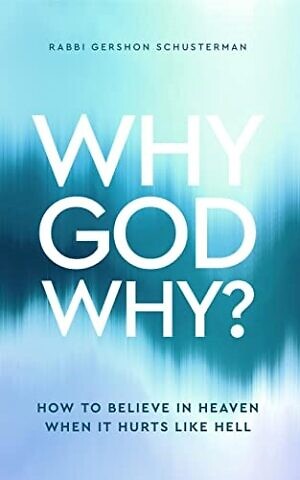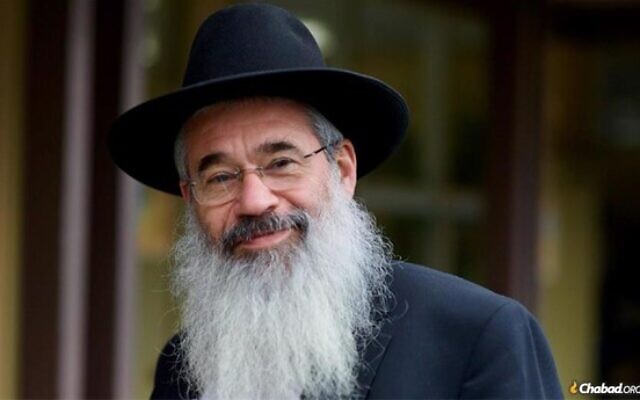‘Why God Why’ by Rabbi Gershon Schusterman
Rabbi Gershon Schusterman is an Orthodox Jewish rabbi and longtime founder of six Chabad Lubavitch branches in Southern California.
Everyone, at some point in time, has faced a life-altering event like the death of a family member, a loss of a job, a divorce, and countless other heartbreaking incidents. If you believe in G-d, our natural instinct at these times is to not only express anger towards G-d, but also to ask G-d why he could let this happen.
Anger precipitates the “Why.” In his first book, “Why God Why,” Rabbi Gershon Schusterman explores the rationale as to why these events can occur. He ties in his real-life experience when, at age 38, his wife’s sudden death, at age 36, left him a widow with 11 children to raise, along with being a director of a day school, the Hebrew Academy of Huntington Beach in Southern California.
This left him seeking the answers to questions he so often counseled others on.
In 1981, Rabbi Harold Kushner wrote a very popular book called, “When Bad Things Happen to Good People,” to help people deal with tragic events. On the surface, this sounds very similar to the book Rabbi Schusterman has just written exploring why bad things happen when they do. However, Rabbi Schusterman takes it to the next level explaining that Kushner’s philosophy is at odds with the Judaism that our Torah teaches and what our rabbis have understood and explained for thousands of years.

Unlike Kushner, who minimizes the power of G-d, Rabbi Schusterman sees G-d as an all-powerful being who directs or allows all outcomes that we do not elect to choose. In understanding tragedy, Kushner ties the events to bad luck while Rabbi Schusterman meticulously ties tragedy to G-d’s will and explains his teachings throughout every chapter in the book citing several examples from Torah.
One of the central themes of the book is the concept of theodicy which, thankfully, the book really clarified. In simple words, theodicy is an attempt to justify or defend G-d in the face of evil by answering the following problem, which, in its most basic form, involves these assumptions: G-d is all good and all powerful (and, therefore, all knowing). The universe/creation was made by G-d and/or exists in a contingent relationship to G-d.
In terms of tragic events and evil, nothing could have been more horrific than the Holocaust where six million Jews were killed. I was intrigued with this chapter in the book to see if there really was an answer to G-d’s role in the Holocaust. Rabbi Schusterman referred to this as the “tragedy of tragedies,” an event so terrible that ended up turning many people off from G-d. Rabbi Schusterman tells us that G-d created evil to ultimately foster good and drive our motivation to make moral choices. Without the darkness of evil, we could never appreciate the light and goodness to come from it. Only G-d knows the real reasons for the events he orchestrates in our lifetime.
Unfortunately, as humans, we will never know the answer to why there was a Holocaust. Rabbi Menachem Mendel Schneerson conceded that there are things that lie beyond humanity’s finite understanding. Rabbi Yosef Yitzchak Schneerson would say, “It is not our task to justify G-d on this. Only G-d himself can answer for what He allowed to happen.”
This is a book not just about having faith but about living in faith. Rabbi Schusterman makes a poignant statement in Chapter 7 regarding faith and how we must constantly nurture it to bridge the gap between just having faith and actually living by faith. Faith helps us deal with the anger up front from a tragic event and then how to move past the suffering we endure. We may never know the exact reasons why G-d directs things to happen, but we do know he has his reasons for everything that occurs.
Something tragic or life-altering could just be a course correction G-d is providing to an individual, groups of people or even a country itself. We can’t see the big picture, only G-d can. This book will not only challenge your personal faith in G-d but will hopefully open your mind to truly understanding his presence in all our lives and to foster a deeper relationship with G-d.
- Arts and Culture
- Books
- Opinion
- Lou Ladinsky
- death of a family member
- Why God Why
- Rabbi Gershon Schusterman
- Hebrew Academy of Huntington Beach
- Rabbi Harold Kushner
- When Bad Things Happen to Good People
- theodicy
- evil
- holocaust
- tragedy of tragedies
- Rabbi Menachem Mendel Schneerson
- Rabbi Yosef Yitzchak Schneerson
- living in faith




comments